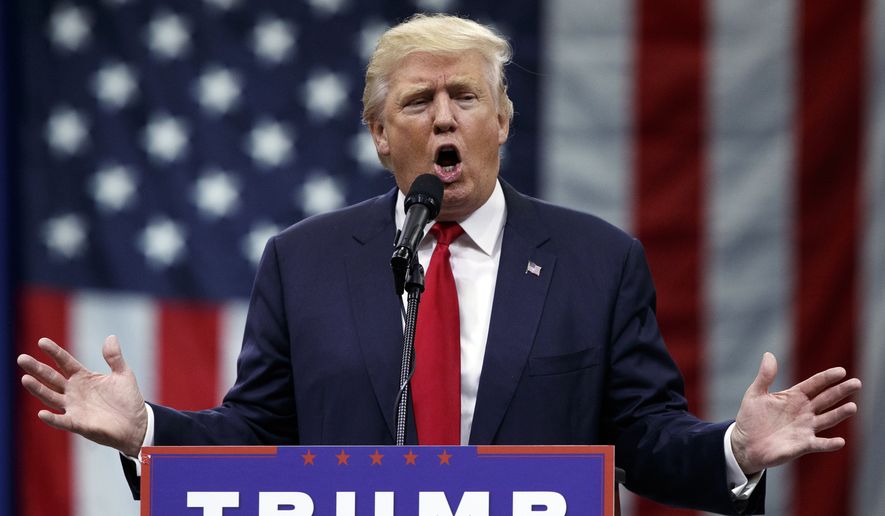OPINION:
For decades, Republicans have written off union support as unobtainable and, therefore, not worth pursuing. A coalition of local union leaders from 16 states could change that for Donald Trump.
When the AFL-CIO endorsed Hillary Clinton in June, it was a johnny-come-lately. The Service Employees International Union endorsed Mrs. Clinton last November followed by the American Federation of Government Employees in December. But those endorsements don’t preclude effective union support for Mr. Trump at the local level, even by parts of the same unions.
The National Industrial Base Workforce Coalition is an ad-hoc group of union local presidents from states including California, Ohio, Florida, West Virginia and Maryland. They represent some of the workers in what national security experts call the “defense industrial base,” the American industrial capacity to produce ships, satellites, aircraft and the other tools of war. These union local presidents represent, among others, parts of the International Brotherhood of Electrical Workers, the International Association of Machinists, the coal miners and the United Steelworkers union. Unusually, it also contains a strong group of West Virginia coal miners.
I say “unusually” because I’ve had experience with these coalitions. About 30 years ago when I was working in the Washington office of a major aerospace company, I was introduced to a very unusual guy named Mike Balzano.
Mr. Balzano grew up in Hartford, Conn., and was thought to be mentally retarded. He worked as a garbage man until someone figured out that he was dyslexic, not retarded. He turned out to be something of a political genius, picking up a doctorate from Georgetown University along the way.
Mr. Balzano led a Nixon White House effort to recruit ethnic people and blue-collar workers into Nixon’s “new majority.” That new majority was rightly credited for re-electing Nixon. Despite Mr. Balzano’s success, and the heady experience of working directly for a president, he never strayed from his blue-collar allies and roots.
When Mr. Balzano and I worked together, I learned that defense industry unions and management could work together easily on a broad range of political issues as long we steered clear of labor contract matters such as wage and hour issues. It’s a lesson Republicans shouldn’t reject but often do.
The 2016 industrial base coalition has published a resolution addressed to both presidential candidates. It argues that that millions of jobs have been lost in the coal, shipbuilding, aerospace and electronics industries as well as our civil space program and the U.S. merchant fleet. At the same time our defense industrial capacity is waning, the resolution says, America faces rising threats from Russia, China, North Korea and international terrorism.
Those jobs, once lost, can’t be recreated overnight. It takes several years to train a journeyman welder so he can create perfect welds on a nuclear submarine (or a nuclear reactor) every time. Machinists and unionized engineers who can manufacture parts for satellites and fighter aircraft expertly also take years to train. The same goes for skilled electricians and many more trade and professional workers.
The resolution calls upon both presidential candidates to pledge to restructure America’s education system to include vocational studies, trade schools and apprenticeship programs aimed at restoring the strength of our industrial base.
In his speech accepting the Republican nomination, Donald Trump said that he wanted to put steel workers and coal miners back to work. Vice presidential candidate Mike Pence made similar points in his speech.
Both Hillary Clinton and Tim Kaine made promises on the economy and jobs. Mrs. Clinton even mentioned trade schools. But Democrats’ consistent support for more and more military budget cuts and Mrs. Clinton’s “We’re going to put a lot of coal miners and coal companies out of business” statement last year are likely to cause the Clinton campaign to ignore the coalition.
Mrs. Clinton is also saddled with a Democratic platform that says climate change is a “real and urgent threat” and calls for setting a price on greenhouse gas emissions, which means either imposing a tax or creating a “cap and trade” scheme like the one that has already failed in Europe. She’ll steer clear of coal miners and probably defense unions as well.
That doesn’t mean that Mr. Trump and Mr. Pence can afford to ignore the defense unions. In previous elections some Republican presidential candidates have embraced similar Balzano-organized coalitions — e.g., both Presidents Bush — and some have turned their backs on them entirely, including both Mitt Romney and John McCain.
Mr. Romney and Mr. McCain ignored the obvious and potentially huge political benefit of these coalitions: They represent a doorway to what we used to call the “Reagan Democrats,” people who are social moderates but consistent believers in strong defense. A candidate willing to walk through that doorway may find himself presiding over another “new majority.”
On several occasions, Mr. Trump has said that he “has tremendous support within unions.” If he chooses to meet with the coalition, he could prove himself right.
The coalition members seek invitations to meet each of the candidates to talk to them about their concerns. If Mr. Trump can shake off the normal Republican distrust of unions and recognize the gains he can make among blue-collar Americans, he will get such a meeting soon, so the labor leaders can take what he says back to their locals. The word will spread quickly beyond the defense and coal industries.
Whittling away at the Democrats’ labor union bloc probably won’t be the deciding factor in November. But it can be a beginning of a concerted effort to gain the votes of the Reagan Democrats, even those too young to know the term.
• Jed Babbin served as a deputy undersecretary of defense in the George H.W. Bush administration. He is a senior fellow of the London Center for Policy Research and the author of five books including “In the Words of Our Enemies.”




Please read our comment policy before commenting.